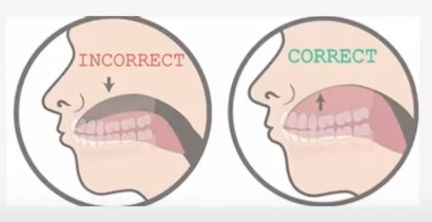Posture Your Tongue for Better (Spiritual) Health
Your tongue is much more than just an instrument for speech or eating, prompting some to ask:
Have you ever thought about how your tongue could be affecting your posture even all the way down to your feet?
What if something as simple as where your tongue rests in your mouth could influence your body’s alignment, balance, and even breathing?
The tongue is more than just a muscle for speaking and eating, it’s deeply connected to the body through fascia, an intricate web of connective tissue that links the tongue to the feet.

It's true. An internet query of a growing body of research reveals that the position of your tongue can influence your posture, balance, breathing, and even facial structure. Here's some of the ways tongue posture can affect your overall health:
POSTURE
- Muscle Tension: Your tongue is connected to muscles in your jaw, neck, and even your shoulders. Poor tongue posture (e.g., pressing against your teeth or lying flat at the bottom of your mouth) can create tension in these areas, leading to misalignment like slouched shoulders or forward head posture.
- Spinal Alignment: When your tongue rests properly — on the roof of your mouth just behind your front teeth — it helps stabilize the head and neck, which supports better spinal posture.
BALANCE
- Proprioception Boost: Proper tongue posture may enhance proprioception — your body's ability to sense its position in space. This can improve balance and stability, especially in people with vestibular disorders.
- Sensory Substitution: The tongue can deliver balance-related signals to the brain, directly affect equilibrium.
BREATHING
- Airway Support: A tongue resting low in the mouth can block the airway, leading to shallow breathing. Proper tongue posture opens the airway, encouraging nasal breathing and better oxygen intake.
FACIAL STRUCTURE
Palate Development: Especially in children and young adults, resting the tongue against the roof of the mouth helps shape the palate and support facial symmetry. Poor posture can lead to a narrower palate and less prominent cheekbones over time.
So, much research has been done, supporting the theory that the tongue is much more key to the body's overall health than previously realized, again prompting some to ask,
"Could improving tongue posture be the missing key to better posture, core strength, and overall movement efficiency?"
*Click here to watch a video on proper tongue posture.
Well, well, well. Perhaps science is lagging a bit behind Scripture when it comes to realizing the immense importance and power of the tongue — well, maybe not physically, but certainly spiritually!
We are told variously throughout the Scriptures of this and so much more:
"So also the tongue is a small member, yet it boasts of great things. How great a forest is set ablaze by such a small fire! And the tongue is a fire, a world of unrighteousness. The tongue is set among our members, staining the whole body, setting on fire the entire course of life, and set on fire by hell. ... But no human being can tame the tongue. It is a restless evil, full of deadly poison" (James 3:5-6,8, ESV).
"Death and life are in the power of the tongue, and those who love it will eat its fruits" (Proverbs 18:21, ESV).
"If anyone thinks he is religious and does not bridle his tongue but deceives his heart, this person's religion is worthless" (James 1:26, ESV).
"A gentle tongue is a tree of life, but perverseness in it breaks the spirit" (Proverbs 15:4, ESV).
Our tongues must take the proper "spritual" posture, or else they can ruin the health of the entire body, and worse, they can be used as a weapon to ruin others! Prompting one to ask ...
"Could improving spiritual tongue posture be the missing key to better health, core strength, and overall spiritual maturity and efficiency?"
Wag Those Tongues to God's Glory
If you haven't heard the Tyrolean Tongue Choir (from the Austrian Alps region of Tyrol) perform "a rumbling, a cappella chorus by flicking their tongues back and forth," frantically within their mouths, then you have clearly never truly experienced music! (Obviously spoken "tongue in cheek" LOL).
But seriously, it actually is a thing! Click here to listen to their moving version of "Moscow Nights," performed exclusively with their linguae naturales.
If you actually watch the video, you'll likely not get through it without either laughing or crigning. But if you close your eyes and just listen, it's actually quite entertaining.

Scripture has some pretty harsh words concerning the influence of the tongue.
"[T]he tongue is a small member, yet it boasts of great things. How great a forest is set ablaze by such a small fire! And the tongue is a fire, a world of unrighteousness. The tongue is set among our members, staining the whole body, setting on fire the entire course of life, and set on fire by hell" (James 3:5-6, ESV). ...
"But no human being can tame the tongue. It is a restless evil, full of deadly poison" (James 3:8, ESV).
But take heart, all is not darkness! If anything, it's a pretty mixed bag ...
"Death AND LIFE are in the power of the tongue, and those who love it will eat its fruits" (Proverbs 18:21, ESV).
"With it we bless our Lord and Father, and with it we curse people who are made in the likeness of God" (James 3:9, ESV).
We CAN learn to discipline our tongues for both our own good and the good of others.
"There is one whose rash words are like sword thrusts, but the tongue of the wise brings healing (Proverbs 12:18, ESV).
"For 'Whoever desires to love life and see good days, let him keep his tongue from evil and his lips from speaking deceit'" (1 Peter 3:10, ESV).
"Let no corrupting talk come out of your mouths, but only such as is good for building up, as fits the occasion, that it may give grace to those who hear" (Ephesians 4:29, ESV).
"A gentle tongue is a tree of life, but perverseness in it breaks the spirit" (Proverbs 15:4, ESV).
"Whoever keeps his mouth and his tongue keeps himself out of trouble" (Proverbs 21:23, ESV).
Since the tongue can be such a duplicitous vessel, we must be sure to petition the Lord to "Set a guard, O Lord, over [our] mouths; keep watch over the door of [our] lips!" (Psalms 141:3, ESV). To do anything less, puts us in great peril of judgment. "I tell you, on the day of judgment people will give account for every careless word they speak, for by your words you will be justified, and by your words you will be condemned" (Matthew 12:36-37, ESV).
We can get a good chuckle out of the Austrian Tongue Choir. But it's such a riotously funny illustration of how the tongue CAN be used to make life more harmonious and pleasant.
Amidst the cacaphony of crassness, crudeness, cursing, and cruelty. Be the Austrian Tongue Choir, and wag those tongues to the rhythm of and to the glory of the grace of God!
The Creeping Influence of Bad Habits
(The following illustration has applicatoin for both "bad" habits and "good" habits alike. As such, this illustration will appear in the database twice, with alternative applications dealing with both types of habits.)
Bad habits can kind of creep up on you. You're fine. You're handling them. Until ... you're not.
Imagine that you have an ice cube sitting on the table in front of you. The room is cold and you can see your breath. It is currently twenty-five degrees. Ever so slowly, the room begins to heat up. Twenty-six degrees. Twenty-seven. Twenty-eight. The ice cube is still sitting on the table in front of you. Twenty-nine degrees. Thirty. Thirty-one. Still, nothing has happened. Then, thirty-two degrees. The ice begins to melt. A one-degree shift, seemingly no different from the temperature increases before it, has unlocked a huge change. [Effects] are often the result of many previous actions, which build up ... unleash[ing] a major change. This pattern shows up everywhere. Cancer spends 80 percent of its life undetectable, then takes over the body in months. Bamboo can barely be seen for the first five years as it builds extensive root systems underground before exploding ninety feet into the air within six weeks.

Bad habits are a lot like those stealthy bamboo shoots. They seem to be nothing to be worried about. They don't seem to be having any significant impact on your life or well being. Until one day, you can't keep them underground any longer. The negative impacts burst through the surface, and bam! Suddnely you have a 50 foot tall bamboo stalk casting shade over your entire existence.
Don't be duped. Those small, bad habits can turn into serious problems quickly. That is why we are cautioned by Scripture to take mastery over our attitudes and action before they take mastery over us.
"All things are lawful for me, but not all things are helpful. All things are lawful for me, but I will not be dominated by anything" (1 Corinthians 6:12, ESV).
"Do not be deceived: God is not mocked, for whatever one sows, that will he also reap. For the one who sows to his own flesh will from the flesh reap corruption, but the one who sows to the Spirit will from the Spirit reap eternal life. And let us not grow weary of doing good, for in due season we will reap, if we do not give up" (Galatians 6:7-9, ESV).